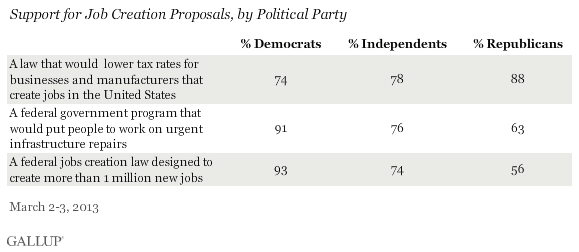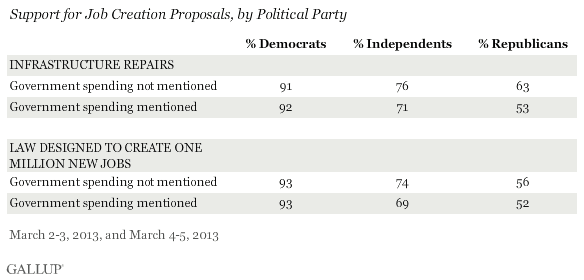PRINCETON, NJ -- Americans widely support each of three job creation proposals, including offering tax breaks to businesses that create jobs in the U.S. and a program that would put people to work on urgent infrastructure repair projects. Support for these programs is only slightly lower in a variant of the question that asks respondents if they are in favor of spending government money to pay for the programs.
![Next, suppose that on Election Day you could vote on key issues as well as candidates. Would you vote for or against -- [RANDOM ORDER]?](http://content.gallup.com/origin/gallupinc/GallupSpaces/Production/Cms/POLL/rkysebnzb0uwooifpboyvq.gif)
The data are based on Gallup polling from March 2-3 and March 4-5. The job creation items were included with other policy proposals in a Gallup issue referendum, asking respondents if they would vote "for" or "against" the proposal in a hypothetical vote on the issue. The items asked March 2-3 did not mention the need for government spending on these programs but the March 4-5 items did. The explicit mention of government spending reduced support for the programs by three to five percentage points. This suggests Americans' support for job creation outweighs concerns they may have about government spending.
President Obama offered all three of these job creation proposals in his 2013 State of the Union address. He also put forward some of the same proposals -- including business tax breaks and infrastructure programs -- in a nationally televised speech on jobs legislation he gave in September 2011. Americans were about as likely to support those proposals at that time as they are now. Interestingly, though, support for Obama's 2011 job package as a whole was significantly lower than it was for most of the individual proposals included in it.
Majority of Party Groups Favor Each Jobs Proposal
A majority of Democrats, Republicans, and independents support each of the three job creation proposals tested in the poll. Republicans are much more supportive of business tax breaks than the new job programs, and Democrats are more likely to favor the job creation programs, while independents show roughly equal support for all three.

Democrats' support for the job creation proposals are as high when mentioning government spending as when not mentioning it, while independents' and Republicans' support declines when spending is mentioned.

Implications
Job creation proposals enjoy widespread public support, including majority backing among all party groups, even when the issue of government spending is raised in an era when deficit reduction is one of the major priorities for the federal government. Despite the high levels of support for the job creation proposals, the political realities in Washington are such that Congress has not passed any of the proposals since President Obama first advocated many of these more than a year ago. The major sticking point with jobs legislation -- as with most other measures being considered in Washington -- may not be whether the programs should be pursued but whether the government should pay for them through increased taxes or cuts in other government programs.
Survey Methods
Results for this Gallup poll are based on telephone interviews conducted March 2-3 and March 4-5, 2013, on the Gallup Daily tracking survey, with a random sample of approximately 1,000 adults, aged 18 and older, living in all 50 U.S. states and the District of Columbia.
For results based on these total samples of national adults, one can say with 95% confidence that the margin of sampling error is ±4 percentage points.
Interviews are conducted with respondents on landline telephones and cellular phones, with interviews conducted in Spanish for respondents who are primarily Spanish-speaking. Each sample of national adults includes a minimum quota of 50% cellphone respondents and 50% landline respondents, with additional minimum quotas by region. Landline telephone numbers are chosen at random among listed telephone numbers. Cellphones numbers are selected using random digit dial methods. Landline respondents are chosen at random within each household on the basis of which member had the most recent birthday.
Samples are weighted to correct for unequal selection probability, nonresponse, and double coverage of landline and cell users in the two sampling frames. They are also weighted to match the national demographics of gender, age, race, Hispanic ethnicity, education, region, population density, and phone status (cellphone only/landline only/both, cellphone mostly, and having an unlisted landline number). Demographic weighting targets are based on the March 2012 Current Population Survey figures for the aged 18 and older U.S. population. Phone status targets are based on the July-December 2011 National Health Interview Survey. Population density targets are based on the 2010 census. All reported margins of sampling error include the computed design effects for weighting.
In addition to sampling error, question wording and practical difficulties in conducting surveys can introduce error or bias into the findings of public opinion polls.
View methodology, full question results, and trend data.
For more details on Gallup's polling methodology, visit www.gallup.com.
